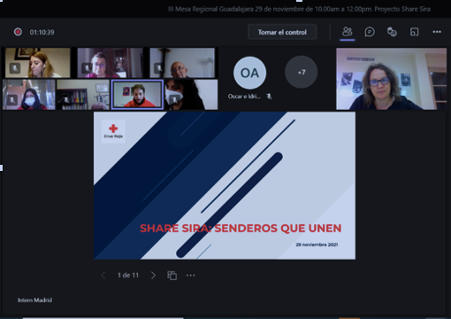Third regional multi-stakeholder cooperation platform for migrant and refugee integration in Guadalajara
The regional platform is set up in the framework of the Share SIRA project, our European project co-funded by the European Union’s Asylum, Migration and Integration Fund, which aims at strengthening and expanding the social orientation and overall integration of newcomers in rural territories in Europe. Besides Guadalajara, regional multi-stakeholder cooperation platforms have also been set up in 9 other rural regions in Europe. Click here to find out more about these regions!
On 29 November 2021, IOM Spain and Fundación CEPAIM, with the support of ICMC Europe (lead of the SHARE Network), organized the third roundtable of the regional multi-stakeholder cooperation platform for migrant and refugee integration in the Province of Guadalajara, Spain.
16 stakeholders joined the online event including regional authorities and agencies, NGOs, migrant and refugee led organisations, volunteers, as well as refugees and migrants.
After a presentation of the long-term vision for EU’s Rural Areas, and of the pilot actions selected in the framework of the Share SIRA project, a space for discussion was opened to address the topic of migrants' participation in forums and activities. The discussion revolved around a series of questions:
What constitutes genuine participation?
What does participation entail? What opportunities does social and community participation offer?
What tends to be the main motivation for participating in forums and meeting spaces?
What is the level of involvement of migrants in community activities and participation forums?
What are the main challenges to participation, especially for migrants?
Proposals for good practices to promote the participation of migrants and address the challenges were also identified. In the context of the SIRA project, the participants noted the lack of pilot actions developed by newcomers themselves. It was suggested that, if migrants' associations do not have the capacity to submit proposals to this type of call for proposals, it would be interesting for them to be accompanied by entities with more resources and capacity so that they can build their knowledge and skills. Participants stressed the need to give migrant associations the necessary resources to propose activities in line with their interests and concerns instead of newcomers being solely beneficiaries of these activities.
Activities involving the migrant population are often limited to folkloric festivities and events (music, gastronomy, etc.) and it is important to go further and involve them in other types of fora. It was also pointed out that the involvement of migrants in places of worship encourages the creation of support and collaboration networks in other areas.
One of the participants with long experience in participation highlighted the changes in these practices in recent decades, which have been adapted to the local context and the evolution of the migration phenomenon. In the 1990s, actions included giving talks and awareness-raising workshops in schools for instance. Later on the focus shifted to the creation of spaces for meeting and interaction between migrants and the local population. This was followed by actions to promote the normalisation of the presence and participation of migrants in local events, encouraging migrants to attend different local gatherings and activities.
Participants agreed that it is important to generate spaces for coexistence. Holding meetings in neutral spaces tends to work much better because migrants tend to feel safer, more at ease and end up having a greater sense of belonging. In relation to this observation, in the discussion between participants it was noted that the pilot projects selected in the framework of Share SIRA include outdoor activities and green spaces.
The stakeholders involved in the regional platforms will gather on one more occasion in 2022. You can find more information on the activities in Guadalajara on the regional webpage.



